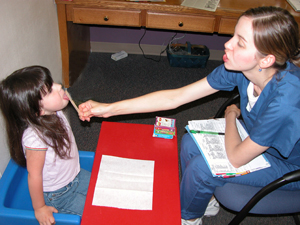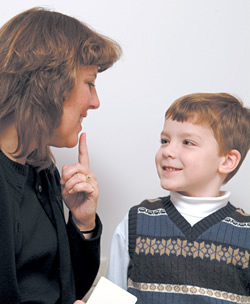SPEECH THERAPY


What Is Speech-Language Therapy?
Speech-language therapy is the treatment for most children with speech and/or language disorders. A speech disorder refers to a problem with the actual production of sounds, whereas a language disorder refers to a difficulty understanding or putting words together to communicate ideas.
Speech Disorders and Language Disorders
Speech disorders include the following problems, according to Diane Paul-Brown, PhD, director of clinical issues in speech-language pathology at the American Speech-Language-Hearing Association (ASHA):
Articulation disorders include difficulties producing sounds in syllables or saying words incorrectly to the point that other people can't understand what's being said.
Fluency disorders include problems such as stuttering, the condition in which the flow of speech is interrupted by abnormal stoppages, repetitions (st-st-stuttering), or prolonging sounds and syllables (ssssstuttering).
Resonance or voice disorders include problems with the pitch, volume, or quality of a child's voice that distract listeners from what's being said. These types of disorders may also cause pain or discomfort for the child when speaking.
Language disorders can be either receptive or expressive. Receptive disorders refer to difficulties understanding or processing language. Expressive disorders include difficulty putting words together, limited vocabulary, or inability to use language in a socially appropriate way.
Specialists in Speech-Language Therapy
Speech-language pathologists (SLPs), who are often informally known as speech therapists, are professionals educated in the study of human communication, its development, and its disorders. They hold at least a master's degree and state certification/licensure in the field, as well as a certificate of clinical competency from the American Speech-Hearing-Association.
By assessing the speech, language, cognitive-communication, and swallowing skills of children and adults, speech-language pathologists can determine what types of communication problems exist and the best way to treat these challenges.
Speech-language pathologists typically treat problems in the areas of articulation; dysfluency; oral-motor, speech, and voice; and receptive and expressive language disorders.
Remediation
Speech-language therapy involves having a speech-language specialist work with a child on a one-to-one basis, in a small group or directly in a classroom, to overcome difficulties involved with a specific disorder. Speech-language therapy uses a variety of therapeutic strategies, including:
language intervention activities - These exercises involve having a speech-language specialist interact with a child by playing and talking to him. The therapist may use pictures, books, objects, or ongoing events to stimulate language development. The therapist may also model correct pronunciation and use repetition exercises to build speech and language skills.
articulation therapy - Articulation, or sound production, exercises involve having the therapist model correct sounds and syllables for a child, often during play activities. The level of play is age-appropriate and related to the child's specific needs. Articulation therapy involves physically showing a child how to make certain sounds, such as the "r" sound. A speech-language therapist may demonstrate how a child should move his tongue to produce specific sounds.
When Is Therapy Needed?
Children require speech-language therapy for a variety of reasons, including:
- hearing impairments
- cognitive (intellectual; thinking) or other developmental delays
- weak oral muscles
- birth defects such as cleft lip or cleft palate
- autism
- motor planning problems
- respiratory problems (breathing disorders)
- swallowing disorders
- traumatic brain injury
Therapy should begin as soon as possible. Children enrolled in therapy early in their development (younger than 3 years) tend to have better outcomes than children who begin therapy later.
This does not mean that older children can't make progress in therapy; they may progress at a slower rate because they often have learned patterns that need to be modified or changed.